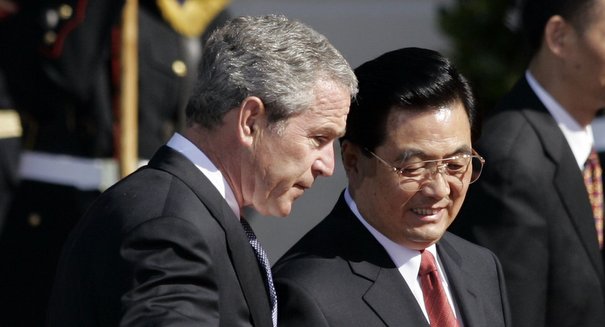Ashley J. Tellis
{
"authors": [
"Ashley J. Tellis"
],
"type": "legacyinthemedia",
"centerAffiliationAll": "dc",
"centers": [
"Carnegie Endowment for International Peace",
"Carnegie China"
],
"collections": [],
"englishNewsletterAll": "",
"nonEnglishNewsletterAll": "",
"primaryCenter": "Carnegie Endowment for International Peace",
"programAffiliation": "SAP",
"programs": [
"South Asia"
],
"projects": [],
"regions": [
"North America",
"United States",
"South Asia",
"India",
"Afghanistan",
"Pakistan",
"East Asia",
"China"
],
"topics": [
"Political Reform",
"Security",
"Military",
"Foreign Policy",
"Arms Control"
]
}
Source: Getty
The Decade That Took Us from Peace to War
The attacks on 9/11 diverted the Bush administration's focus from the rise of China to a new war in Afghanistan, bringing with it the prospect of American military operations in the region and a previously unimaginable rehabilitation of relations with Pakistan.
Source: India Abroad

Brought up on a Cold War diet of great power politics, the new President’s advisers preoccupied themselves with the task of managing China by renewing American strength at home and resuscitating US partnerships abroad. For them, the threat of a systemic transition was at the best of times a difficult problem to manage successfully, and it was only complicated in the case of China because Washington and Beijing were economically interdependent in ways that were never true during the Cold War. The Bush administration was convinced that Beijing was a serious challenge that needed to be handled carefully, and this view was only strengthened by the EP-3 crisis that occurred in April 2001.
Even before the presidential election, Bush’s advisers had already envisaged a new relationship with India as a critical component of the US approach to engaging China. This effort received a strong fillip when Atal Bihari Vajpayee’s government in New Delhi provided an unexpected endorsement of the president’s effort to reorient the strategic nuclear regime. From then on, the transformation of US-India relations gathered steam, galvanized by common concerns in Washington and New Delhi about Beijing’s rise. This process was only aided by Pakistan’s absence from the equation: Islamabad, still under American sanctions, was perceived by the Bush administration as largely irrelevant to the ongoing tectonic shifts in global geopolitics, and, if anything, Pakistan’s loose affiliation with China only made it somewhat suspect.
This geopolitical framework was rudely interrupted by September 11, 2001. Almost overnight, the US focus on China was displaced sharply by an attention on Afghanistan — and with the prospect of American military operations came the hitherto unimaginable rehabilitation of Pakistan.
Islamabad, which until then had been ignored and ignorable, now suddenly became the center of American strategic consideration. Washington’s need for Pakistani cooperation in its newly inaugurated global War on Terrorism raised the prospect that its involvement in international terrorism might be ignored because of the necessities associated with Operation Enduring Freedom. The Chinese response to the new struggle against global terrorism only complicated the American challenge further because Beijing — like many other countries — adroitly exploited the new American preoccupation to strengthen its relations with the US, while intensifying its struggle against domestic opponents in the name of fighting terrorism.
The American objective in these altered circumstances, then, consisted of developing a strategy that would permit Washington to successfully prosecute the campaign against Al Qaeda and the Taliban without the distractions of a subcontinental war, while at the same time weaning Pakistan away from its involvement with terrorism, nudging it towards the path of success, and rebuilding US-Pakistan relations on a more sustainable basis — even as the US leaned on it for assistance in the campaign in Afghanistan. While the administration attempted to manage this dilemma, it simultaneously sought to engage China without losing sight of the fact that Beijing could become a serious long-term threat. And it never quite lost sight of its original desire to build a new relationship with India, though at various moments early on it seemed confused about how exactly to deepen the partnership. Thanks to the indefatigable efforts of Robert D Blackwill, the then American Ambassador to India, and his allies in Washington, this challenge was finally surmounted, despite the complications caused by the renewed US engagement with Pakistan and the transitory displacement of China as a critical strategic concern.
Given the intractable challenges embedded in this strategy, it is a surprise — in retrospect — that the US succeeded as much as it did. The US appears on the cusp of defeating al-Qaeda in Pakistan after a decade of resolute counterterrorism operations, in part because of Islamabad’s assistance. Mark that an A+.
Washington also helped prevent a major India-Pakistan crisis in 2001- 02 from degenerating into a war that might have undermined the larger campaign against terrorism; it subsequently facilitated crisis management when India became a victim of Pakistani- supported terrorism in 2008; and it forged a US-Indian counterterrorism partnership that has contributed towards enhancing Indian security even if it has not decisively eliminated the continuing sources of threat towards both India and the US. That deserves at least an A–.
Through a concerted effort at ‘dehyphenation,’ which culminated in the civilian nuclear cooperation agreement, both Bush and his successor Barack Obama engaged New Delhi and took the bilateral relationship to new heights, laying the foundations for a geopolitical reorientation of global significance over the long term. Clearly an A.
The failures, however, are just as significant. For all the efforts expended so far, the US is no closer to eliminating Pakistan’s involvement in terrorism today or transforming Pakistan into a successful state than it was in 2001; Washington’s partnership with Islamabad remains fraught and the prospects for a new beginning remain bleak so long as Pakistan remains hostage to an uninspiring civilian leadership and a solipsistic military. Mark that an indisputable D.
Defeating the Taliban in Afghanistan still lies beyond reach in large measure because of Washington’s failure to attain Islamabad’s full cooperation. That earns a D as well.
The challenges involving China, though muted since 2001, still persist and will only grow more virulent over time. China’s power continues to steadily increase, and if its rise persists long enough, China could begin to threaten the United States in consequential ways in Asia and beyond. Although Washington, like New Delhi, seeks to benefit from China’s continued growth, neither American nor Indian leaders have yet found solutions that guarantee that Beijing’s continuing ascendancy will remain peaceful, given that US competition with China will likely grow in extent and intensity as the opportunistic cooperation born out of 9/11 slowly gives way to rising economic challenges, deeper geopolitical rivalry, and increased military threats to the United States and its allies. Mark that an incomplete.
And the largest challenge of all and one that matters above all else — restoring America’s strength at home — has scarcely begun to be addressed. That remains the most consequential incomplete of all.
About the Author
Former Senior Fellow
Ashley J. Tellis was a senior fellow at the Carnegie Endowment for International Peace.
- Multipolar Dreams, Bipolar Realities: India’s Great Power FuturePaper
- India Sees Opportunity in Trump’s Global Turbulence. That Could Backfire.Commentary
Ashley J. Tellis
Recent Work
Carnegie does not take institutional positions on public policy issues; the views represented herein are those of the author(s) and do not necessarily reflect the views of Carnegie, its staff, or its trustees.
More Work from Carnegie Endowment for International Peace
- How Far Can Russian Arms Help Iran?Commentary
Arms supplies from Russia to Iran will not only continue, but could grow significantly if Russia gets the opportunity.
Nikita Smagin
- Is a Conflict-Ending Solution Even Possible in Ukraine?Commentary
On the fourth anniversary of Russia’s full-scale invasion, Carnegie experts discuss the war’s impacts and what might come next.
- +1
Eric Ciaramella, Aaron David Miller, Alexandra Prokopenko, …
- The Kremlin Is Destroying Its Own System of Coerced VotingCommentary
The use of technology to mobilize Russians to vote—a system tied to the relative material well-being of the electorate, its high dependence on the state, and a far-reaching system of digital control—is breaking down.
Andrey Pertsev
- Indian Americans Still Lean Left. Just Not as Reliably.Commentary
New data from the 2026 Indian American Attitudes Survey show that Democratic support has not fully rebounded from 2020.
- +1
Sumitra Badrinathan, Devesh Kapur, Andy Robaina, …
- China Is Worried About AI Companions. Here’s What It’s Doing About Them.Article
A new draft regulation on “anthropomorphic AI” could impose significant new compliance burdens on the makers of AI companions and chatbots.
Scott Singer, Matt Sheehan













